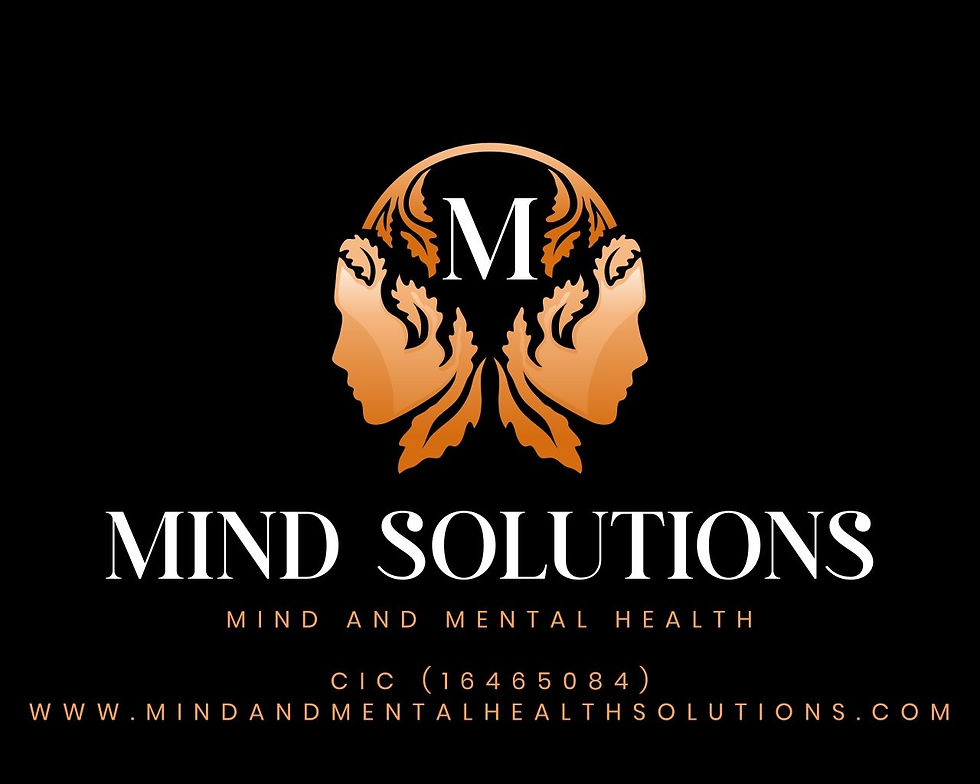Mind and Mental Health: Resources for Wellbeing Together
- tracyannhughes81
- Nov 13, 2025
- 3 min read
Mental health is a crucial aspect of our overall wellbeing, yet it often remains overlooked in our fast-paced lives. The importance of nurturing our mental health cannot be overstated; it affects how we think, feel, and act. In this blog post, we will explore various resources and strategies to support mental health, emphasizing the importance of community and connection in our journey towards wellbeing.

Understanding Mental Health
Mental health encompasses our emotional, psychological, and social wellbeing. It influences how we handle stress, relate to others, and make choices. Mental health is vital at every stage of life, from childhood and adolescence through adulthood.
Common Mental Health Issues
Some common mental health issues include:
Anxiety Disorders: Characterized by excessive fear or worry.
Depression: A mood disorder that causes persistent feelings of sadness and loss of interest.
Bipolar Disorder: Involves extreme mood swings that include emotional highs (mania) and lows (depression).
Obsessive-Compulsive Disorder (OCD): Characterized by unwanted repetitive thoughts (obsessions) and behaviors (compulsions).
Post-Traumatic Stress Disorder (PTSD): A mental health condition triggered by experiencing or witnessing a traumatic event.
Understanding these conditions is the first step towards seeking help and finding effective resources.
The Importance of Community Support
One of the most effective ways to enhance mental health is through community support. Engaging with others who share similar experiences can provide comfort and understanding. Here are some ways to foster community support:
Support Groups
Support groups offer a safe space for individuals to share their experiences and feelings. They can be found in various formats, including:
In-person meetings: Local community centers often host support groups for specific issues.
Online forums: Websites and social media platforms provide virtual spaces for discussion and support.
Friends and Family
Building a strong support network of friends and family can significantly impact mental health. Open communication about feelings and experiences fosters understanding and connection.
Professional Help
Sometimes, professional help is necessary. Therapists and counselors can provide guidance and coping strategies tailored to individual needs.
Resources for Mental Health
There are numerous resources available to support mental health. Here are some valuable options:
Hotlines and Helplines
National Suicide Prevention Lifeline: Offers 24/7 support for individuals in crisis.
Crisis Text Line: Provides free, 24/7 support via text message.
Online Resources
Mental Health America: Offers a wealth of information on mental health conditions, treatment options, and support resources.
NAMI (National Alliance on Mental Illness): Provides education, support, and advocacy for individuals affected by mental illness.
Apps for Mental Health
Technology has made it easier to access mental health resources. Here are some popular apps:
Headspace: Focuses on mindfulness and meditation.
Calm: Offers guided meditations, sleep stories, and relaxation techniques.
Moodfit: Helps users track their mood and provides resources for improving mental health.
Strategies for Maintaining Mental Wellbeing
In addition to utilizing resources, there are practical strategies individuals can adopt to maintain mental wellbeing:
Regular Exercise
Physical activity has been shown to reduce symptoms of anxiety and depression. Aim for at least 30 minutes of moderate exercise most days of the week.
Healthy Eating
A balanced diet can positively impact mental health. Incorporate plenty of fruits, vegetables, whole grains, and lean proteins into your meals.
Mindfulness and Meditation
Practicing mindfulness can help reduce stress and improve emotional regulation. Consider setting aside time each day for meditation or deep-breathing exercises.
Adequate Sleep
Sleep plays a vital role in mental health. Aim for 7-9 hours of quality sleep each night. Establish a bedtime routine to improve sleep hygiene.
Setting Boundaries
Learning to say no and setting boundaries can help prevent burnout and maintain mental health. Prioritize self-care and ensure you have time for activities that bring you joy.
The Role of Education in Mental Health
Education plays a crucial role in breaking the stigma surrounding mental health. By increasing awareness and understanding, we can create a more supportive environment for those struggling with mental health issues.
Mental Health Education in Schools
Incorporating mental health education into school curricula can help students understand the importance of mental wellbeing. Programs that teach coping strategies and emotional regulation can empower young people to manage their mental health effectively.
Workplace Mental Health Initiatives
Employers can also play a role in supporting mental health. Implementing mental health initiatives, such as employee assistance programs (EAPs) and mental health days, can foster a healthier work environment.
Conclusion
Mental health is an essential component of our overall wellbeing, and it is crucial to prioritize it in our lives. By utilizing available resources, fostering community support, and adopting healthy habits, we can enhance our mental health and support those around us. Remember, you are not alone in this journey. Reach out, seek help, and take the necessary steps towards a healthier mind and a happier life.
As we continue to navigate the complexities of mental health, let us work together to create a supportive community where everyone feels valued and understood.



Comments